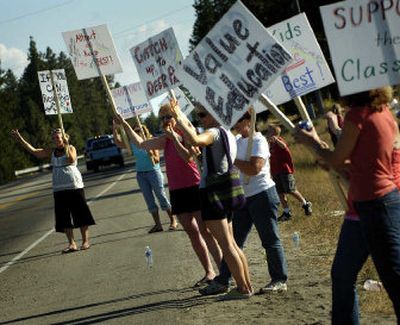Riverside teachers picket

Teachers with the Riverside School District lined up along Highway 2 for an informational picket Friday, after months of contract negotiations failed to produce an agreement between the district and its teachers union.
“It’s not a strike, we’re just getting information out there,” said Cory Neville, a Riverside teacher and president of the Riverside Education Association.
Contract negotiations between the 1,800-student district and its teachers began in February and came to an impasse July 20, largely over wage increases, benefits, and new contract language.
Lower salaries and fewer benefits paid to teachers in the rural district compared with what other area districts provide make it difficult to attract and keep qualified teachers, staff said.
“We continue to lose good teachers, and that’s not good for our students,” said Tina Andrews, a fourth-grade teacher who lined up with other teachers near the intersection at Highway 2 and Deer Park-Milan Road waving picket signs. “We’re not out here because we want more money. We are out here because we want to keep quality teachers.”
The district north of Spokane is one of a handful of districts in the state heading into the last weeks before school without a contract, said officials with the Washington Education Association, the state teachers union. Most districts negotiating contracts without dissension tend to finish up by mid-summer.
“It is difficult to be in this position close to school now. Our hope is by Thursday at the latest we’ll have things resolved,” Neville said. School begins Sept. 6.
A mediator was brought in Friday for the first of three meetings between district negotiators and the teachers union. Two more meetings are planned next week.
As teachers waved at passing vehicles on the highway, holding pickets signs that read “Catch up with Deer Park” and “Attract the Best,” both the district and the union worked throughout the day to come to an agreement.
Several points are at issue, including a proposed pay increase. A beginning Riverside teacher makes about $31,000 a year. On average, that is about $2,500 to $3,000 less per year than their peers in Deer Park, which has roughly the same number of students, Neville said. Riverside teachers make as much as $9,000 less than teachers in the Mead School District to the south, he said.
The union, which represents about 112 teachers in Riverside, proposed wage increases of 7 to 10 percent pay, spread over a three-year period, to make up the gap.
“They came in asking for a lot of money, and we came with huge changes in contract language,” said Superintendent Galen Hansen. “We need to meet somewhere in the middle.”
Turmoil is not new to the Riverside school community.
The district has dealt with 11 lawsuits in the last four years and is still paying for the buyout of the previous superintendent, Jerry Wilson.
The district bought out the final three years of Wilson’s contract in 2000, following months of conflict that led to more than 200 teachers and community members holding a walkout against him.
Wilson sued the district over breach of contract in 2001 and so did three other administrators, Hansen said.
When Hansen came on board as superintendent in 2000, the district had a budget deficit of $1.5 million.
After cuts and belt-tightening, “within a year we were able to come back in the black,” Hansen said. “We’ve worked very hard to heal the community and to come together. To picket brings all of it back.We’re hopeful we can come to an agreement.”
Teachers said they’ve donated personal days to the district to help with budget woes and have worked to create curricula because there wasn’t enough money for textbooks.
REA officials said they’ve also watched as administrator expenses, including wages, have grown by nearly 23 percent, while money spent on teachers increased only 6 percent. The district also won’t pay the health care “carve out” or money paid to the state to help with the cost of health care for retired teachers, while most other districts do. Teachers pay for the benefit.
“As teachers we’ve really had to buckle down, and we’ve done that. Now we feel it’s time for us to feel like we’re respected,” said elementary teacher Bill Shaw. “We’d like to be treated like our peers: We want to know that teachers are a priority.”